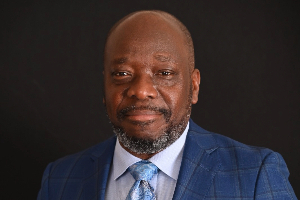Introduction
In this second paper we continue to resolve the “socialist ideology” confusion plaguing the Nkrumaist family and put it in its proper social-political context, in order to enable Nkrumaists to regain their confidence and think of fighting elections to win Office and Govern Ghana once more. In the first paper we dealt with “Our Socialist History and Confusion.” In this second paper we point the way forward.
We concluded in that first paper that the idea, that socialism is the ideology of philosophical Consciencism, as taught in The Kwame Nkrumah Institute of Economics and Political Science in the 1960s by Kodwo Addison, Bankole Akpata and Samuel G. Ikoku amongst others was simply incorrect. Nkrumaist ideology is not socialism and never has been. Nkrumaist ideology has always been ‘Consciencism’. The ideology of philosophical consciencism has always been consciencism. The philosophy of Nkrumaism has always been philosophical Consciencism. Moreover, “socialism” in Nkrumaism is a social-political theory and practice derived from materialism in the same way that capitalism is also a social-political theory and practice derived from idealism. Thus, both capitalism and socialism are understood as social-political theories of development in Nkrumaist ideology. This correction of the ideological position which is overdue is necessary to build the confidence of Nkrumaists for Government Now.
The Way Forward
Let us therefore proceed to trace the truth in Consciencism: the Philosophy and ideology for De-Colonisation and Development with particular reference to the African Revolution itself so that Nkrumaists may know the truth so that the truth can set them free to fight and win elections in Ghana and elsewhere and govern Ghana once again.
We shall allow Nkrumah to speak for himself as we quote Consciencism. Let us start from the notion of Ghana as a society in which there exists a plurality of men of diverse ethnicity whether Ashantis, Ewes, Dagombas etc: “When a plurality of men exist in society, and it is accepted that each man needs to be treated as an end in himself, not merely as a means, there transpires a transition from ethics to politics. Politics become actual, for institutions need to be created to regulate the behavior and actions of the plurality of men in society in such a way as to conserve the fundamental ethical principle of the initial worthiness of each individual. Philosophical consciencism consequently adumbrates a political theory and a social-political practice which together seek to ensure that the cardinal principle of ethics are effective. The social-political practice is directed at preventing the emergence or the solidifying of classes, for in the Marxist conception of class structure, there is exploitation and the subjection of class to class. Exploitation and class-subjection are alike contrary to consciencism. By reason of its egalitarian tenet, philosophical consciencism seeks to promote individual development, but in such a way that the conditions for the development of all becomes the conditions for the development of each; that is, in such a way that the individual development does not introduce such diversities as to destroy the egalitarian basis. The social-political practice also seeks to co-ordinate social forces in such a way as to mobilize them logistically for the maximum development of society along true egalitarian lines. For this, planned development is essential.” So it is clear that in society philosophy precedes political theory and social-political theory/practice. It is also clear that political parties are an expression of politics and political organisation in society. Thus, “politics” which arises from a society is conceptually separate from the structure of political institutions. These political institutions can take many forms. Thus a one-party state is only one of them. A multi-party state is also another example. Thus contrary to the indoctrination at Kwame Nkrumah Institute of Economics and Political Science, multi-party politics cannot be simply dismissed as bourgeois politics that socialists must eschew. This anti-bourgeois thinking then leads to the contradictory position in which socialist ideologues seek state power through undemocratic means such as a coup d’etat that overthrows the popular will. Thus all Nkrumaists must accept multi-party democracy however informal or formalised as an essential feature of the democratic aspect of African communalism. Like any society, Ghana is also placed in nature. The rise of politics also concurs with the need to make economic decisions, subject to economic laws, as to what to produce (which means of life), for whom to produce (all the people or a class), where to produce (the location of industry), when to produce (time), how to produce (science and technology) and who will do the production (labour power) amongst others.
This is the way Nkrumah puts it in: “Every society is placed in nature. And it seeks to influence nature, to impose such transformations upon nature, as will develop the environment of the society for its better fulfilment. The changed environment, in bringing about a better fulfilment of the society, thereby alters the society. Society placed in nature is therefore caught in the correlation of transformation with development. This correlation represents the toil of man both as a social being and as an individual. This kind of correlation has achieved expression in various social-political theories. For a social-political theory has a section which determines the way in which social forces are to be deployed in order to increase the transformation of society. In every non-socialist society, there can be found two strata which correspond to that of the oppressor and the oppressed, exploiter and the exploited. In all such societies, the essential relation between the two strata is the same as that between masters and slaves, lords and serfs. In capitalism, which is only a social-political theory in which the important aspects of slavery and feudalism are refined, a stratified society is required for its proper functioning, a society is required in which the working class is oppressed by the ruling class; for, under capitalism, that portion of society whose labors transform nature and produce goods is not the portion of society which enjoys the fruits of this transformation and productivity. Nor is it the whole of society which is so enhanced … If one seeks the social-political ancestor of socialism, one must go to communalism. Socialism has characteristics in common with communalism, just as capitalism is linked with feudalism and slavery. In socialism, the principles underlying communalism are given expression in modern circumstances. Thus, whereas communalism in an untechnical society can be laissez faire, in a technical society where sophisticated means of production are at hand, if the underlying principles of communalism are not given centralized and correlated expression, class cleavages arise, which are the result of economic disparities, and accompanying political inequalities. Socialism, therefore, can be and is the defense of the principles of communalism in a modern setting. Socialism is a form of social organization which, guided by the principles underlying communalism, adopts procedures and measures made necessary by demographic and technological developments.” Thus, Consciencism makes it clear that, like capitalism, socialism is a social-political theory which, in the case of socialism, can be used to organise society so that all the people benefit from development rather than a section of society. The ideology of philosophical consciencism is therefore not socialism. On the contrary, it is Consciencism. And here we come to the source of the socialist confusion, for although ‘socialism’ “can be and is the defense of the principles of communalism in a modern setting”, there was no need to call it socialism as it could easily be confused with Marxist socialism, scientific socialism, Fabian socialism, Christian socialism and African socialism amongst other variants, as indeed is still the case even today amongst Nkrumaists. So by naming the form of social organisation advocated by Nkrumaist ideology socialism, Nkrumah and Ghana found itself at the centre of the East-West Cold war and all its disastrous consequences.
Nkrumah then links up philosophy, social-political practice and political forces as follows: “I have explained how society's desire to transform nature reflects itself in different social-political theories. I wish now to suggest how the same desire reflects itself in philosophy. Just as social-political theories…fall into two lots, so do philosophies. From this standpoint, the two real social alternatives facing society are either that one section should produce, and another section batten thereon, or that all sections should produce and all sections should be fulfilled by the value created by labor. In the same way, there are two real philosophical alternatives. These alternatives coincide with idealism and materialism. In the preceding chapter, I explained how idealism was connected with a tiered society, how through its mode of explaining nature and social phenomena by reference to spirit, idealism favored a class structure of a horizontal sort, in which one class sat upon the neck of another. I also explained there how materialism, on the other hand, was connected with a humanist organization, how through its being monistic, and its referring all natural processes to matter and its laws, it inspired an egalitarian organization of society. The unity and fundamental identity of nature suggests the unity and fundamental identity of man in society. Idealism favors an oligarchy, materialism favors an egalitarianism. Individuals have both idealist and materialist tendencies in them. So have societies both idealist and materialist streaks. But these streaks do not exist in equipoise. They are connected by a conflict in which now one streak predominates, now the other. By reason of the connection of idealism with an oligarchy and of materialism with an egalitarianism, the opposition of idealism and materialism in the same society is paralleled by the opposition of conservative and progressive forces on the social level.” So far it is clear that the philosophy of Nkrumaism is philosophical consciencism; the ideology of Nkrumaism is consciencism and not socialism. Socialism is only a social political theory just like capitalism is also a social-political theory. But socialism and communism as understood is placed within Marxism which derives from hard core materialism. And hard core materialism is unacceptable to Africans. Capitalism as understood is placed within both conservatism and liberalism (and versions of liberalism-conservatism) which both derive from idealism. And hard core idealism is also unacceptable to Africans. Africans see both matter and spirit as a continuum. Thus political economy (socialism) as historically understood within Marxism and economics (capitalism) as understood within liberalism-conservatism do not both express the position of philosophical Consciencism and therefore of the African world-view. Philosophical Consciencism is a synthesis of both materialism and idealism and its response to both socialism and capitalism as social-political theories of development must also be a synthesis of both capitalism and socialism and a new social-political terminology. Thus the dictatorship of capital under capitalism for instance and the dictatorship of the proletariat under socialism are both unacceptable to philosophical Consciencism. The use of the term socialism has blurred this distinction between socialism in Consciencism (where it is a modern expression of African communalism) and socialism in Marxism. The notion of socialist ideology and therefore a “socialist, one party system” as the best framework for achieving social justice blurs that distinction even further. The ideological confusion it leads to is the anomalous position where idealism either culturally undermines African communalism or materialism culturally undermines African communalism; and both are not in tune with the egalitarian basis of traditional African society. Another anomaly is where it leads to liberals foisting Fabian socialism on Africa while Marxists foist Marxist socialism on Africa, both with disastrous consequences because they are neither in tune with the African Personality. By the African Personality here I do not mean George Hagan’s view that “African personality is just the myth of “one family, one blood” writ large” , but Nkrumah’s notion that “The African personality is itself defined by the cluster of humanist principles which underlie the traditional African society . Philosophical consciencism is that philosophical standpoint which, taking its start from the present content of the African conscience, indicates the way in which progress is forged out of the conflict in that conscience.” This conflict in conscience was intensified; for while Fabian Socialism accepted the notion of an oligarchy within liberalism, Marxist socialism asked for the creation of a capitalist class only in order for us to seek to overthrow it; but the position of philosophical Consciencism is to reject an oligarchy and to concurrently prevent its creation. So this use of the nomenclature of socialism, without its adequate distinction in a philosophical synthesis, in order to assert the scientific nature of socialism to the extent of rejecting the notion of African socialism, led to the ideological impasse in which socialism is understood as capable of thriving only when capitalism has been completely destroyed and vice versa.
Today, the way out of this impasse for Nkrumaists is to now use a new social-political theoretical terminology which must be understood as a synthesis beyond socialism and capitalism. This new social-political terminology like philosophical Consciencism can be called economic Consciencism; to the extent that it borrows its synthetic scientific tools from both liberal economics (idealism) and Marxian economics (materialism), we propose to call it PROGRESSIVE ECONOMICS, to distinguish it from the others.
Note on Writer: Kwami Christian Agbodza is the Regional Education Secretary for CPP UK & Ireland and writes in his personal capacity.
Opinions of Saturday, 26 December 2009
Columnist: Agbodza, Kwami














